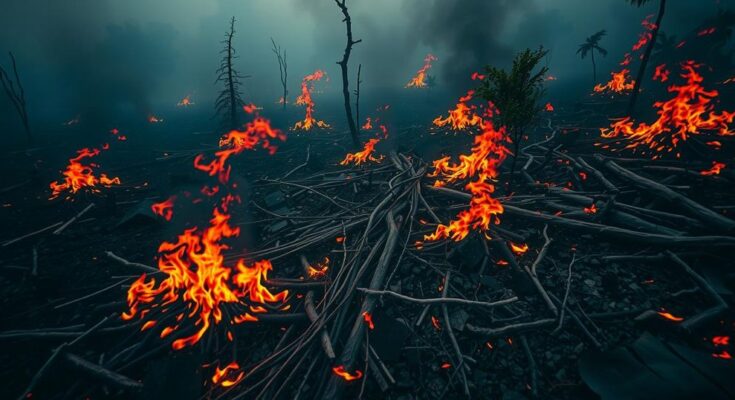Wildfires in Brazil’s Amazon have surged dramatically, devastating an area the size of Switzerland. The destruction spiked due to climate change and increased criminal activity exploiting drought conditions. Scientists warn this could lead to long-term ecological collapse. Increased fires raise alarms just before the upcoming COP30 climate conference, propelling discussions on reforestation and policy reform to combat illegal land use.
In Brazil, wildfires have ravaged an area equivalent to Switzerland, marking an unprecedented ecological disaster. As smoke disperses with seasonal rains, the extent of forest loss emerges, profoundly alarming scientists. The Amazon Environmental Research Institute reported an astonishing 846% increase in burned areas from January to mid-October 2024 compared to 2023. This spike surpasses the destructive fires of 2019 by a considerable margin, highlighting the critical state of the rainforest as it heads into a crucial climate conference next year. The methods used by criminals exploiting climate-induced vulnerabilities have shifted. Traditionally, deforestation commenced with chainsaws and labor-intensive logging, but as droughts render the forest tinder-dry, criminals now effectively use gasoline to ignite flames. Director Ane Alencar notes that while drought exacerbates the situation, fire has become a weapon in this environmental assault. The Amazon’s weakened ability to withstand prolonged dry conditions is alarming and indicative of systemic ecological failure. Lawmakers recognize the dire consequences: a mere handful of culprits can ignite catastrophic fires. With severe drought conditions persisting for two consecutive years, vital waterways have been reduced to record lows, affecting both wildlife and local human communities. September brought a wave of wildfires that doubled the burned acreage within months, setting alarming precedent levels for destruction in the rainforest, with estimates starkly indicating that 1,900 square kilometers went up in flames, predominantly in Jamanxim National Forest. Authorities suspect that landgrabbers are corruption-prone opportunists seeking to capitalize on this devastation. The Jamanxim National Forest suffers heavily, serving as a focal point for illegal cattle ranchers aiming to claim territory that would otherwise remain protected. These flames built upon a foundation of political support for aggressive economic policies have transformed an ecological crisis into a hotbed for crime and exploitation. To combat these overwhelming threats, Brazilian officials discuss mandatory reforestation laws for burned areas to deter illegal land conversion. Local governments also bear responsibility, as most fires originate from private lands beyond federal oversight. Addressing the challenges posed by climate change requires deep-rooted changes in policy to inhibit future catastrophes. The surge in wildfires in the Amazon reflects a global pattern contributing to worsening climate change. A recent study published in the journal Science estimates that carbon emissions from forest fires have jumped by 60% between 2001 and 2023. In juxtaposition, unlike wildfires in North America that devastate treetops, fires in the Amazon predominantly consume the ground cover, leading to severe but often unaccounted damage to the ecosystem. Despite rampant fires, Brazil’s deforestation rates may decrease significantly under the current administration, highlighting the complexity of measuring forest health and sustainability. Nevertheless, officials warn that prolonged drought and recurring fires could have devastating long-term consequences, potentially leading to total forest collapse in the most affected areas, thus leaving the fate of the rainforest hanging by a thread.
The article centers around the alarming increase in wildfires in Brazil’s Amazon rainforest, exacerbated by climate change and severe drought conditions. It highlights the illegal activities of criminals who exploit these conditions for land-grabbing, raising concerns about whether climate change is becoming a tool for environmental exploitation. The dramatic surge in burned areas poses significant threats to biodiversity and the ecological balance of one of the world’s most critical ecosystems, setting the stage for urgent discussions at the upcoming COP30 climate conference.
The article paints a grave picture of Brazil’s Amazon rainforest, where unprecedented wildfires fueled by human actions and climate change are wreaking havoc on the ecosystem. As illegal activities threaten conservation efforts, a multifaceted approach involving reforestation initiatives and stricter policies is essential to mitigate further damage. The simplicity of igniting a forest reflects a complex interplay between environmental degradation and crime, emphasizing the need for robust interventions to save this vital ecological treasure from impending doom.
Original Source: www.news4jax.com



